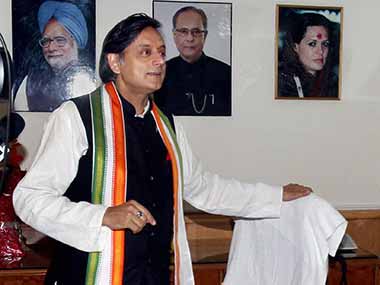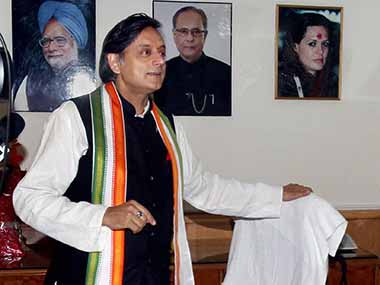The near-unanimous applause received by Shashi Tharoor for his Oxford speech on whether Britain owed reparations to India for its colonial era depredations tells us more about ourselves than the Congress MP’s oratorical or debating skills. The man who has repeatedly been sent to the doghouse by his own party for speaking his mind, and, more recently, by a segment of the media that has decided he had something to do with his wife Sunanda’s death, found himself declared a hero by former critics, with even Prime Minister Narendra Modi complimenting him for it. [caption id=“attachment_2127219” align=“alignleft” width=“380” class=" “]  Image courtesy: PTI[/caption] The deficit in the area of applause came from his party leadership, which has so far said nothing on it. Most probably the top leadership does not want heroes outside the family. On the contrary, Sonia Gandhi is alleged to have “scolded” Tharoor for obliquely criticizing his party’s disruptions in parliament - something he denied on TV yesterday (23 July) - just when he was becoming the toast of the town. While we can leave aside the Gandhi family’s churlishness in failing to compliment one of its own MPs, what needs analysis is why India found Tharoor to be a hero on the basis of one speech when it was willing to believe the worst about him a few days earlier. My own pop psychology analysis leads me to conclude the following: Indians are desperately seeking heroes we can all admire. Fractious as we are among ourselves on anything and everything, we tend to be manic-depressive when seeking or debunking heroes. Our champ-to-chump cycles of public approval and disapproval are extremely volatile. MS Dhoni can overnight turn from Captain Cool to Captain Fool who can do nothing right, and Tharoor can become instant hero after being consigned to media pariah status for a while. There is never a reversal to the mean in our case: between hero and zero there are no grey zones of balanced assessment; Narendra Modi can be a development messiah one day, or a fascist Hitler the next. Not only that, we tend to read the same act differently when it involves two different people. If Shashi Tharoor’s speech had been made by, say, Mohan Bhagwat of the RSS, it would probably be seen as boorish behaviour on the soil of his gracious British hosts or the worst type of jingoism. The sheer variability of our assessments of people and situations indicates deep insecurities and anxieties in us. These insecurities are manifested in how we seek to designate people as heroes, and what we seek in leaders. Even though Indians have learnt to live more comfortably with diversity and difference than the west, we have still not been able to find commonality in who we find heroic and who we don’t. Hence the need to find heroes in cricket and sport and in speeches against British colonialism. Our Indianness is stronger when we can define a common enemy rather than in any positive purpose. We can’t find common ground on even a Nehru or a Gandhi. The Tharoor speech carried the day with all of us because everyone could agree on Britain as the villain of the piece. He would have been criticized by the Right or the Left if he had chosen to speak on one of our national personalities - whether Nehru or Patel or Netaji or Savarkar. Our internal diversity and mistrust prevents us from agreeing on common heroes. Today the only consensus we have is on Ambedkar, and even this is more because many people don’t want to be politically incorrect about a Dalit icon Apart from a desperate search for common heroes whom we debunk equally callously when our mood shifts, Indians are schizophrenic on the need for strong leaders. We crave strong leaders who project power because we know otherwise there will be no order in politics (or in any sphere of public life). At the same time, we dislike the stifling nature of the personality cult that afflicts all political parties. Today there is almost no political party that does not accept one-party-one-leader as the norm. Out of the two exceptions, BJP and the Communists, the BJP under Modi has headed in this direction with astonishing political results, and the one party still to embrace this cult (CPM) is heading for the political wilderness. More than being true democrats, what emerges is this reality: our extreme diversity makes democracy a necessity. What we truly desire in not debate or discussion, but the veto over other people’s preferences. Our insecurities and lack of self-esteem inclines us to accept benign autocracy over collective leadership and democratic debate; and we still put more faith in individuals and caste groups than in institutions and the rule of law. The argumentative india is less about argumentation and debate and more about finding a reason to oppose those we don’t like - as our politicians demonstrate every day. Tharoor brought us together for reasons that may not last. We are yet to leave our insecurities and low self-esteem behind. This is why we are inclined to see insults when none may be intended; this is why we mobilise around convicted criminals rather than accept the neutrality of law. We have a long way to go in cultivating a true democratic spirit where the law and institutions are above everything else.
The near-unanimous applause received by Shashi Tharoor for his Oxford speech tells us more about ourselves than the Congress MP’s oratorical or debating skills.
Advertisement
End of Article
Written by R Jagannathan
R Jagannathan is the Editor-in-Chief of Firstpost. see more


)
)
)
)
)
)
)
)
)



